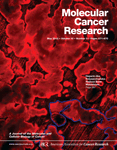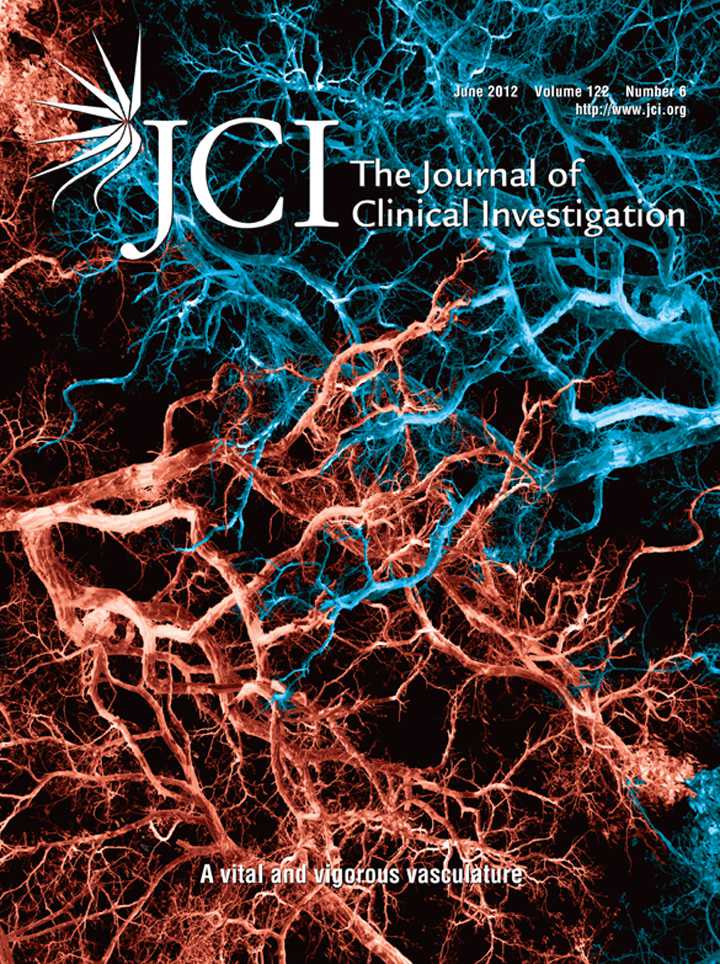Nature:解开结肠癌获得性抵抗EGFR阻断治疗之谜
2012-06-18 bo 生物谷
6月13日,Nature杂志在线报道了结肠癌获得性抵抗EGFR阻滞治疗研究的重要进展。表达野生型KRAS蛋白的结肠癌细胞往往对EGFR阻断治疗敏感。但在该治疗开始几个月后,几乎都发生抵抗性。对获得性抗EGFR抗体抵抗的机制尚不清楚。这种情况与某些小分子靶向治疗药物的情况大相径庭。比如,在ABL、EGFR、BRAF和MEK等蛋白的编码基因突变时,才会出现针对其相应抑制剂的治疗抵抗。 关于对EGFR

6月13日,Nature杂志在线报道了结肠癌获得性抵抗EGFR阻滞治疗研究的重要进展。表达野生型KRAS蛋白的结肠癌细胞往往对EGFR阻断治疗敏感。但在该治疗开始几个月后,几乎都发生抵抗性。对获得性抗EGFR抗体抵抗的机制尚不清楚。这种情况与某些小分子靶向治疗药物的情况大相径庭。比如,在ABL、EGFR、BRAF和MEK等蛋白的编码基因突变时,才会出现针对其相应抑制剂的治疗抵抗。
关于对EGFR阻断治疗出现抵抗这一异常现象,最简单的假说是:在这些表面上表达野生型KRAS的肿瘤组织中,实际预先存在少量KRAS突变的肿瘤细胞。尽管这一假说似乎容易证明,但却既没有临床前模型的证据,也没有来自患者的数据。
本研究试图证实,在给予抗EGFR抗体panitumumab治疗的28名患者的循环血中是否可检测到突变型KRAS的DNA。结果发现,在24名治疗前KRAS为野生型的患者中有9名(38%)患者的血清检测出突变型KRAS。其中3名的突变为多位点的不同突变。这些突变的出现是持续性的,常在治疗后5到6个月出现。数学模型提示,这些突变出现在panitumumab治疗起始前扩大的亚克隆群落中。
这些发现提示,KRAS的突变是获得性EGFR阻滞治疗抵抗的媒介;而且,这些突变可以用非侵入的方法检测到。这解释了为什么实体瘤可以高度可重复的方式发生对靶向性治疗的抵抗。

doi:10.1016/j.cell.2011.10.017
PMC:
PMID:
The molecular evolution of acquired resistance to targeted EGFR blockade in colorectal cancers
Luis A. Diaz Jr,1, 2 Richard T. Williams,3 Jian Wu,1, 4 Isaac Kinde,1 J. Randolph Hecht,5 Jordan Berlin,6 Benjamin Allen,7 Ivana Bozic,7 Johannes G. Reiter,7, 8 Martin A. Nowak,7 Kenneth W. Kinzler,1 Kelly S. Oliner3 & Bert Vogelstein1
Colorectal tumours that are wild type for KRAS are often sensitive to EGFR blockade, but almost always develop resistance within several months of initiating therapy1, 2. The mechanisms underlying this acquired resistance to anti-EGFR antibodies are largely unknown. This situation is in marked contrast to that of small-molecule targeted agents, such as inhibitors of ABL, EGFR, BRAF and MEK, in which mutations in the genes encoding the protein targets render the tumours resistant to the effects of the drugs3, 4, 5, 6. The simplest hypothesis to account for the development of resistance to EGFR blockade is that rare cells with KRAS mutations pre-exist at low levels in tumours with ostensibly wild-type KRAS genes. Although this hypothesis would seem readily testable, there is no evidence in pre-clinical models to support it, nor is there data from patients. To test this hypothesis, we determined whether mutant KRAS DNA could be detected in the circulation of 28 patients receiving monotherapy with panitumumab, a therapeutic anti-EGFR antibody. We found that 9 out of 24 (38%) patients whose tumours were initially KRAS wild type developed detectable mutations in KRAS in their sera, three of which developed multiple different KRAS mutations. The appearance of these mutations was very consistent, generally occurring between 5 and 6?months following treatment. Mathematical modelling indicated that the mutations were present in expanded subclones before the initiation of panitumumab treatment. These results suggest that the emergence of KRAS mutations is a mediator of acquired resistance to EGFR blockade and that these mutations can be detected in a non-invasive manner. They explain why solid tumours develop resistance to targeted therapies in a highly reproducible fashion.
本网站所有内容来源注明为“梅斯医学”或“MedSci原创”的文字、图片和音视频资料,版权均属于梅斯医学所有。非经授权,任何媒体、网站或个人不得转载,授权转载时须注明来源为“梅斯医学”。其它来源的文章系转载文章,或“梅斯号”自媒体发布的文章,仅系出于传递更多信息之目的,本站仅负责审核内容合规,其内容不代表本站立场,本站不负责内容的准确性和版权。如果存在侵权、或不希望被转载的媒体或个人可与我们联系,我们将立即进行删除处理。
在此留言














#Nat#
70
#获得性#
74
#阻断#
66
#GFR#
93